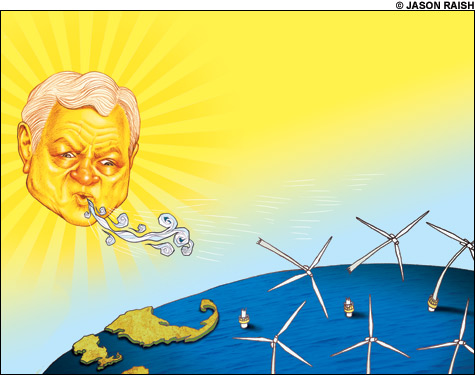
This editorial has interesting implications both for renewable energy projects, and for indigenous rights. Give it a read.
NYtimes:
After eight years of arduous state and federal environmental reviews, the promoters of Cape Wind, a wind energy project off the Massachusetts coast, had every reason to believe that they were home free. Then the Wampanoag tribes asked the Interior Department to declare all of Nantucket Sound, where the 130 wind turbines would be built, a “traditional cultural property” and, they hoped, block construction.
Tribal officials say their culture requires them to greet the sunrise each day and that this ritual requires unobstructed views. Their claim should be rejected by the responsible federal and state officials. Another round of bureaucratic reviews would drag out an approval process that has gone on much too long and give opponents time to find some other way to derail the effort.
The tribes’ claim seems unsupportable. “Traditional cultural properties” tend to be defined areas — a ceremonial burial ground, for instance — not a huge, unenclosed portion of the ocean. Awarding Nantucket Bay such status could cast a legal shadow over a host of other activities, including shipping and commercial fishing.
There is also evidence that the tribes have been working hand-in-glove with the project’s main opposition group, the Alliance to Protect Nantucket Sound. The alliance includes many local people but has been largely underwritten by wealthy homeowners from Nantucket, Martha’s Vineyard and Cape Cod who hate the idea of having 440-foot windmills on the horizon.
The Minerals Management Service, the agency overseeing the approval process, believes that the claims are bogus. But still to be heard from is Brona Simon, the state’s historic preservation officer. If she agrees with the service — and she should — then the matter goes to Interior Secretary Ken Salazar. If she does not, then it goes to the National Park Service for further review and then to Mr. Salazar.
One way or the other, Mr. Salazar should approve the project. Cape Wind is supported by the Massachusetts government and the great majority of its citizens, who see it as a clean alternative to the power plants that contribute to global warming. Rejecting, even delaying it, would send a dispiriting message to other developers who are further behind Cape Wind.
In Europe, wind farms are a familiar sight. If this country is going to do its part to address climate change, they must become more common, and welcome, here.
No comments:
Post a Comment